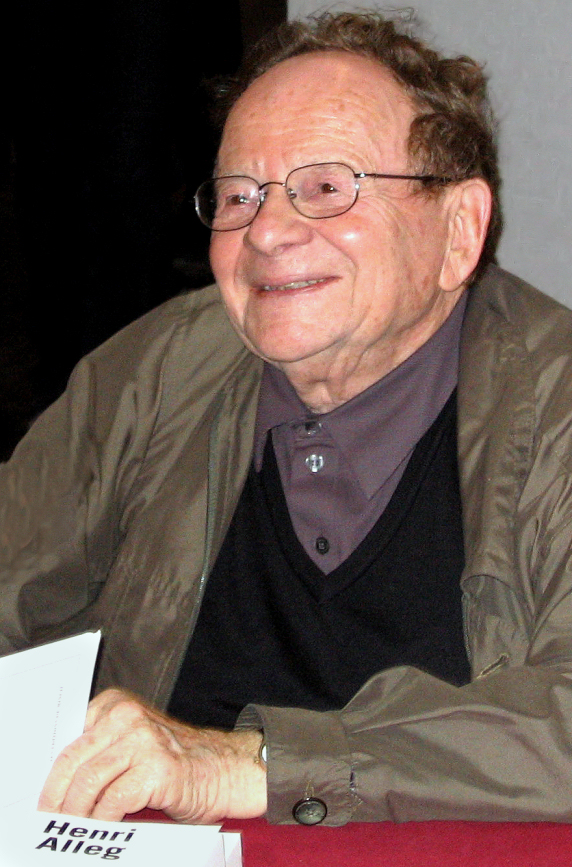
Henri Alleg at the Fête de l’Humanité, 2008
© GFDL / CC BY-SA 4.0
Biography
Henri Alleg was a French journalist born in London in 1921 but was brought up in Paris, France. In 1939 he went to Algeria and involved himself in the Algerian struggle for independence. He joined the Algerian Communist Party and edited the left leaning and pro-independence Alger Républicain newspaper.
Alleg was briefly detained in June 1955 for ‘rebellion and blows against the agents of law and order’ and three months later Alger Républicain was closed by the French colonialists. Alleg subsequently went into hiding after several of his colleagues were arrested, and on 12 June 1957 he was arrested during the “Battle of Algiers” and imprisoned on suspicion of ‘undermining the state’.
On his arrest, Alleg was subjected to severe and brutal torture, including electric shots, ‘truth serum’ and what is now called ‘water boarding’. Alleg was then transferred to the Lodi camp where he wrote a book about his treatment called La Question. The book was smuggled out of jail and published in France, with a preface by Jean-Paul Sartre, in 18 February 1958. It sold 60,000 copies in two weeks before being banned in France. Alleg escaped prison in 1961 and fled to Czechoslovakia. He returned to France after the signing of the Evian Accords in 1962 following which the ban against, La Question was lifted. The book has been translated into many languages and remains in print. Jean Paul Sartre’s preface is an eloquent and impassioned call against torture. He writes: “Up to now it was only those returning from military service, … who have been able to bear witness. They lived among the torturers, their brothers and ours. They know of the victims principally by their screams, their wounds, their sufferings. They point to the sadist, bending over the torn flesh of their victims. And what distinguishes us from these sadists? Nothing does, because we do not protest: our indignation seems to us to be sincere, but would we be indignant if we had lived over there? Would we not have resigned ourselves to it instead? As for myself, I have to read by profession, I have books published, and I have always detested those books that involve us in a cause mercilessly and yet offer not hope or solution. With the publication of La Question, everything is changed: Alleg has saved us from despite and shame because he is the victim himself and because he has conquered torture”.
Alleg continued to write and have books published. Following the 9/11 terror attacks, he campaigned against the use of torture by American forces in the ‘War on Terror’, where the technique of waterboarding has been used as part of their ‘advanced interrogation’ methods. He died in Paris in 2013, aged 91.
Writing Sample
Together they picked up the plank to which I was still attached and carried me into the kitchen. Once there, they rested the top of the plank, where my head was, against the sink. Two or three Paras held the other end. The kitchen was lit only by a weak light from the corridor. In the gloom, I could just make out the faces of Ir—-, Cha—- and Captain De—-, who seemed to have taken over the direction of these operations. Lo—- fixed a rubber tube to the metal tap which shone just above my face. He wrapped my head in a rag, while De—- said to him: ‘Put a wedge in his mouth.’ With the rage already over my face, Lo—- held my nose. He tried to jam a piece of wood between my lips in such a way that I could not close my mouth or spit out the tube.
When everything was ready, he said to me: ‘When you want to talk, all you have to do is move your fingers.’ And he turned on the tap. The rag was soaked rapidly. Water flowed everywhere: in my mouth, in my nose, all over my face. But for a while I could still breathe in some small gulps of air. I tried, by contracting my throat, to take in as little water as possible and to resist suffocation by keeping air in my lungs for as long as I could. But I couldn’t hold on for more than a few moments. I had the impression of drowning, and a terrible agony, that of death itself, took possession of me. In spite of myself, all the muscles of my body struggled uselessly to save myself from suffocation. In spite of myself, the fingers of my two hands shook uncontrollably. ‘That’s it! He’s going to talk,’ said a voice.
The water stopped running and they took away the rag. I was able to breath. In the gloom, I saw the lieutenants and the captain, who, with a cigarette between his lips, was hitting my stomach with his fist to make me throw out the water I had swallowed. Befuddled by the air I was breathing, I hardly felt the blows. ‘Well, then?’ I remained silent. ‘He’s playing games with us! Put his head under again!’
From The Question translated by John Calder (Lincoln; London: University of Nebraska Press, 2006) ISBN-13: 978-0-8032-5960-7, ISBN-10: 0-8032-5960-3.
Useful links
Wikipedia background on Alleg: http://en.wikipedia.org/wiki/Henri_Alleg
More on Alleg’s book, La Question: http://en.wikipedia.org/wiki/La_Question
‘My discovery of Algeria’ by Henri Alleg, published on-line in 2004 http://www.marxists.org/history/algeria/alleg/algeria.htm